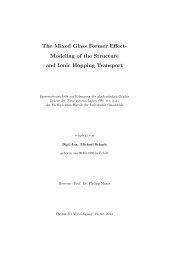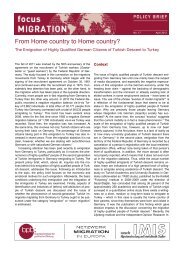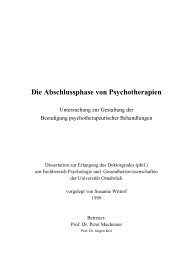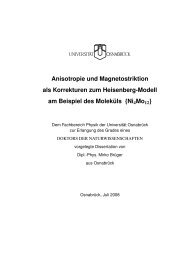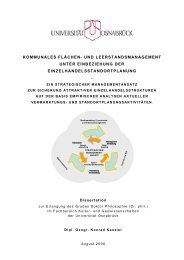LAUX, L. & WEBER, H. (1987). Person-centred coping research. European Journal of Personality, 1(3), 193-214. 350 Literatur LAUX, L. & WEBER, H. (1991). Presentation of self in coping with anger and anxiety: An intentional approach. Anxiety Research, 3(4), 233-255. LAVIE, N., HIRST, A., DE FOCKERT, J. W. & VIDING, E. (2004). Load Theory of Selective Attention and Cognitive Control. Journal of Experimental Psychology: General, 133(3), 339-354. LAWS, K. R. (1999). A meta-analytic review of Wisconsin Card Sort studies in schizophrenia: General intellectual deficit in disguise? Cognitive Neuropsychiatry, 4(1), 1-30. LAZARUS, R. S. (1966). Psychological stress and the coping process. New York: McGraw-Hill. LAZARUS, R. S. & FOLKMAN, S. (1984). Stress, appraisal, and coping. New York: Springer. LAZARUS, R. S. & FOLKMAN, S. (1987). Transactional theory and research on emotions and coping. European Journal of Personality, 1, 141-169. LEE, J. & PARK, S. (2005). Working memory impairments in schizophrenia: A meta-analysis. Journal of Abnormal Psychology, 114(4), 599-611. LEE-BAGGLEY, D., PREECE, M. & DELONGIS, A. (2005). Coping with interpersonal stress: Role of Big Five traits. Journal of Personality, 73(5), 1141-1180. LEVINE, J., WARRENBURG, S., KERNS, R., SCHWARTZ, G., DELANEY, R., FONTANA, A. et al. (1987). The role of denial in recovery from coronary heart disease. Psychosomatic Medicine, 49(2), 109-117. LEVINE, S. Z. & RABINOWITZ, J. (2007). Revisiting the 5 dimensions of the Positive and Negative Syndrome Scale. Journal of Clinical Psychopharmacology, 27(5), 431-436. LEWINE, R. R. J. (2005). Social class of origin, lost potential, and hopelessness in schizophrenia. Schizophrenia Research, 76(2-3), 329-335. LEWIS, A. (1934). The psychopathology of insight. British Journal of Medical Psychology, 14, 332-348. LEWIS, L. (2004). Mourning, insight, and reduction of suicide risk in schizophrenia. Bulletin of the Menninger Clinic, 68(3), 231-244. LEZAK, M. D. (1983). Neuropsychological assessment (2. Aufl.) New York: Oxford University Press. LIDZ, C. & ELLIOTT, J. G. (2000) (Hrsg.). Dynamic assessment: Prevailing models and applications. Amsterdam: Elsevier. LIE, C. H., SPECHT, K., MARSHALL, J. C. & FINK, G. R. (2006). Using fMRI to decompose the neural processes <strong>und</strong>erlying the Wisconsin Card Sorting Test. Neuroimage, 30(3), 1038-1049. LIN, C. C. H., CHEN, W. J., YANG, H.-J., HSIAO, C. K. & TIEN, A. Y. (2000). Performance on the Wisconsin Card Sorting Test among adolescents in Taiwan: Norms, factorial structure, and relation to schizotypy. Journal of Clinical and Experimental Neuropsychology, 22(1), 69-79. LIN, I. F., SPIGA, R. & FORTSCH, W. (1979). Insight and adherence to medication in chronic schizophrenics. Journal of Clinical Psychiatry, 40(10), 430-432. LINCOLN, T. M., LÜLLMANN, E. & RIEF, W. (2007). Correlates and long-term consequences of poor insight in patients with schizophrenia. A systematic review. Schizophrenia Bulletin, 33(6), 1324-1342. LINDEN, M., SCHEEL, T. & RETTIG, K. (2007). Validation of the factorial structure of the Positive and Negative Syndrome Scale in use by untrained psychiatrists in routine care. International Journal of Psychiatry in Clinical Practice, 11(1), 53-60. LINDEN, W., PAULHUS, D. L. & DOBSON, K. S. (1986). Effects of response styles on the report of psychological and somatic distress. Journal of Consulting and Clinical Psychology, 54(3), 309-313. LINK, B. G., CULLEN, F. T., STRUENING, E., SHROUT, P. E. & DOHRENWEND, B. P. (1989). A modified labeling theory approach to mental disorders: An empirical assessment. American Sociological Review, 54(3), 400-423. LINK, B. G. & PHELAN, J. C. (2001). Conceptualizing stigma. Annual Review of Sociology, 27, 363-385. LINN, R. L. & SLINDE, J. A. (1977). The determination of the significance of change between pre- and posttesting periods. Review of Educational Research, 47(1), 121-150. LIPOWSKI, Z. J. (1970). Physical illness, the individual, and the coping process. Psychiatric Medicine, 1(2), 91-102. LOBBAN, F., BARROWCLOUGH, C. & JONES, S. (2003). A review of the role of illness models in severe mental illness. Clinical Psychology Review, 23, 171–196. LOBBAN, F., BARROWCLOUGH, C. & JONES, S. (2004). The impact of beliefs about mental health problems and coping on outcome in schizophrenia. Psychological Medicine, 34(7), 1165-1176. LOBBAN, F., BARROWCLOUGH, C. & JONES, S. (2005). Assessing cognitive representations of mental health problems. I. The illness perception questionnaire for schizophrenia. British Journal of Clinical Psychology, 44(2), 147-162. LÖFFLER, W., KILIAN, R., TOUMI, M. & ANGERMEYER, M. C. (2003). Schizophrenic patients' subjective reasons for compliance and noncompliance with neuroleptic treatment. Pharmacopsychiatry, 36(3), 105-112. LORD, F. M. & NOVICK, M. R. (1968). Statistical theories of mental test scores. Oxford, England: Addison-Wesley. LUCHINS, D. J. (2004). At issue: Will the term brain disease reduce stigma and promote parity for mental illnesses? Schizophrenia Bulletin, 30(4), 1043-1048. LUX, S., HELMSTAEDTER, C. & ELGER, C. E. (1999). Normierungsstudie zum Verbalen Lern- <strong>und</strong> Merkfähigkeitstest (VLMT). Diagnostica, 45(4), 205-211.
351 Literatur LYSAKER, P. H. & BELL, M. (1994). Insight and cognitive impairment in schizophrenia: Performance on repeated administrations of the Wisconsin Card Sorting Test. Journal of Nervous and Mental Disease, 182(11), 656-660. LYSAKER, P. H., BELL, M. & BEAM-GOULET, J. (1995). Wisconsin Card Sorting Test and work performance in schizophrenia. Psychiatry Research, 56(1), 45-51. LYSAKER, P. H., BELL, M. D., BRYSON, G. J. & KAPLAN, E. (1998). Insight and interpersonal function in schizophrenia. Journal of Nervous and Mental Disease, 186(7), 432-436. LYSAKER, P. H., CARCIONE, A., DIMAGGIO, G., JOHANNESEN, J. K., NICOLÒ, G., PROCACCI, M. & SEMERARI, A. (2005). Metacognition amidst narratives of self and illness in schizophrenia: Associations with neurocognition, symptoms, insight and quality of life. Acta Psychiatrica Scandinavica, 112(1), 64-71. LYSAKER, P. H., CLEMENTS, C. A., PLASCAK-HALLBERG, C. D., KNIPSCHEER, S. J. & WRIGHT, D. E. (2002). Insight and personal narratives of illness in schizophrenia. Psychiatry: Interpersonal and Biological Processes, 65(3), 197-206. LYSAKER, P. H., DAVIS, L. W., WARMAN, D. M., STRASBURGER, A. & BEATTIE, N. (2007). Stigma, social function and symptoms in schizophrenia and schizoaffective disorder: Associations across 6 months. Psychiatry Research, 149(1- 3), 89-95. LYSAKER, P. H., LANCASTER, R. S., DAVIS, L. W. & CLEMENTS, C. A. (2003). Patterns of neurocognitive deficits and unawareness of illness in schizophrenia. Journal of Nervous and Mental Disease, 191(1), 38-44. LYSAKER, P. H., ROE, D. & YANOS, P. T. (2007). Toward <strong>und</strong>erstanding the insight paradox: Internalized stigma moderates the association between insight and social functioning, hope, and self-esteem among people with schizophrenia spectrum disorders. Schizophrenia Bulletin, 33(1), 192-199. LYSAKER, P. H. & SALYERS, M. P. (2007). Anxiety symptoms in schizophrenia spectrum disorders: Associations with social function, positive and negative symptoms, hope and trauma history. Acta Psychiatrica Scandinavica, 116(4), 290- 298. LYSAKER, P. H., TAYLOR, A., MILLER, A., BEATTIE, N., STRASBURGER, A. & DAVIS, L. W. (2006). The Scale to Assess Narrative Development: Association with other measures of self and readiness for recovery in schizophrenia spectrum disorders. Journal of Nervous and Mental Disease, 194(3), 223-225. LYSAKER, P. H., WHITNEY, K. A. & DAVIS, L. W. (2006). Awareness of illness in schizophrenia: Associations with multiple assessments of executive function. Journal of Neuropsychiatry & Clinical Neurosciences, 18(4), 516-520. MAASSEN, G. H. (2000a). Kelley's formula as a basis for the assessment of reliable change. Psychometrika, 65(2), 187- 197. MAASSEN, G. H. (2000b). Principles of defining reliable change indices. Journal of Clinical and Experimental Neuropsychology, 22(5), 622-632. MAASSEN, G. H. (2001). The unreliable change of reliable change indices. Behaviour Research and Therapy, 39(4), 495- 498. MAASSEN, G. H. (2004). The standard error in the Jacobson and Truax Reliable Change Index: The classical approach to the assessment of reliable change. Journal of the International Neuropsychological Society, 10(6), 888-893. MACPHERSON, R., JERROM, B. & HUGHES, A. (1996a). A controlled study of education about drug treatment in schizophrenia. British Journal of Psychiatry, 168(6), 709-717. MACPHERSON, R., JERROM, B. & HUGHES, A. (1996b). Relationship between insight, educational backgro<strong>und</strong> and cognition in schizophrenia. British Journal of Psychiatry, 168(6), 718-722. MAIER-RIEHLE, B. & ZWINGMANN, C. (2000). Effektstärkevarianten beim Eingruppe-Prä-Post-Design: Eine kritische Betrachtung. Rehabilitation, 39, 189-199. MALMO, H. P. (1974). On frontal lobe functions: Psychiatric patient controls. Cortex, 10(3), 231-237. MANSOURI, F. A. & TANAKA, K. (2002). Behavioral evidence for working memory of sensory dimension in macaque monkeys. Behavioural Brain Research, 136(2), 415-426. MARKOVÁ, I. S. (2005). Insight in psychiatry. Cambridge: University Press. MARKOVÁ, I. S. & BERRIOS, G. E. (1992a). The meaning of insight in clinical psychiatry. British Journal of Psychiatry, 160, 850-860. MARKOVÁ, I. S. & BERRIOS, G. E. (1992b). The assessment of insight in clinical psychiatry: A new scale. Acta Psychiatrica Scandinavica, 86(2), 159-164. MARKOVÁ, I. S. & BERRIOS, G. E. (1995a). Insight in clinical psychiatry: A new model. Journal of Nervous and Mental Disease, 183(12), 743-751. MARKOVÁ, I. S. & BERRIOS, G. E. (1995b). Insight in clinical psychiatry revisited. Comprehensive Psychiatry, 36(5), 367- 376. MARKOVÁ, I. S., ROBERTS, K. H., GALLAGHER, C., BOOS, H., MCKENNA, P. J. & BERRIOS, G. E. (2003). Assessment of insight in psychosis: A re-standardization of a new scale. Psychiatry Research, 119(1-2), 81-88. MARTIN, R., ROTHROCK, N., LEVENTHAL, H. & LEVENTHAL, E. (2003). Common sense models of illness: Implications for symptom perception and health-related behaviors. In J. Suls & K. A. Wallston (Hrsg.), Social psychological fo<strong>und</strong>ations of health and illness (S. 199-225). Malden, MA, USA: Blackwell Publishing. MARTÍNEZ, M. P. & BOTELLA, C. (2005). An exploratory study of the efficacy of a cognitive-behavioral treatment for hypochondriasis using different measures of change. Psychotherapy Research, 15(4), 392-408.
- Seite 1 und 2:
Krankheitseinsicht, dynamisch getes
- Seite 3 und 4:
Danksagung iii Einleitung Es wird Z
- Seite 5 und 6:
v Einleitung 5.2.3.5 Prozessorienti
- Seite 7 und 8:
vii Einleitung 12.1.3 Ergebnisse St
- Seite 9 und 10:
ix Einleitung Tabelle 45. Hauptkomp
- Seite 11 und 12:
Tabelle 1. Verzeichnis der wichtigs
- Seite 13 und 14:
Abstract xiii Einleitung Objective:
- Seite 15 und 16:
15 Einleitung Angesichts der Belieb
- Seite 17 und 18:
17 Einleitung Bewältigungsmodell v
- Seite 19 und 20:
19 Wisconsin Card Sorting Test 2001
- Seite 21 und 22:
21 Wisconsin Card Sorting Test Effe
- Seite 23 und 24:
23 Wisconsin Card Sorting Test Das
- Seite 25 und 26:
Tabelle 2. Exekutive und Arbeitsged
- Seite 27 und 28:
3.3 Durchführung und Kennwerte des
- Seite 29 und 30:
3.4 WCST-Defizite bei Schizophrenie
- Seite 31 und 32:
Tabelle 5. Konzeptuelles Schema zur
- Seite 33 und 34:
3.5.1 Attributidentifikation / Abst
- Seite 35 und 36:
35 Wisconsin Card Sorting Test oder
- Seite 37 und 38:
37 Wisconsin Card Sorting Test elem
- Seite 39 und 40:
39 Wisconsin Card Sorting Test ein
- Seite 41 und 42:
41 Wisconsin Card Sorting Test Fehl
- Seite 43 und 44:
43 Wisconsin Card Sorting Test zus
- Seite 45 und 46:
45 Wisconsin Card Sorting Test Lern
- Seite 47 und 48:
3.5.5 Orientierungsvariablen 47 Wis
- Seite 49 und 50:
49 Wisconsin Card Sorting Test zehn
- Seite 51 und 52:
51 Wisconsin Card Sorting Test Fehl
- Seite 53 und 54:
53 Wisconsin Card Sorting Test mit
- Seite 55 und 56:
55 Wisconsin Card Sorting Test PAOL
- Seite 57 und 58:
Tabelle 6. Übersicht über Studien
- Seite 59 und 60:
3.7.3 Faktorstruktur des WCST 59 Wi
- Seite 61 und 62:
Tabelle 7 (Fortsetzung). (o) (p) (q
- Seite 63 und 64:
3.8.2 Bildung 63 Wisconsin Card Sor
- Seite 65 und 66:
3.9 Der Dynamische WCST in der Schi
- Seite 67 und 68:
67 Wisconsin Card Sorting Test darg
- Seite 69 und 70:
69 Wisconsin Card Sorting Test WIED
- Seite 71 und 72:
71 Wisconsin Card Sorting Test Durc
- Seite 73 und 74:
73 Wisconsin Card Sorting Test 3.9.
- Seite 75 und 76:
75 Wisconsin Card Sorting Test WALL
- Seite 77 und 78:
4. Statistische Modelle der Veränd
- Seite 79 und 80:
79 Reliable Change Index mittleren
- Seite 81 und 82:
81 Reliable Change Index (b) x2 sol
- Seite 83 und 84:
83 Reliable Change Index (3.) regre
- Seite 85 und 86:
85 Reliable Change Index Bei einem
- Seite 87 und 88:
87 Reliable Change Index statistisc
- Seite 89 und 90:
89 Reliable Change Index der Differ
- Seite 91 und 92:
91 Reliable Change Index Patienten
- Seite 93 und 94:
93 Reliable Change Index Tabelle 8.
- Seite 95 und 96:
95 Reliable Change Index WIEDL, WIE
- Seite 97 und 98:
97 Coping und Abwehr (3.) die oftma
- Seite 99 und 100:
Darstellung der wichtigsten tiefenp
- Seite 101 und 102:
101 Coping und Abwehr unterschiedli
- Seite 103 und 104:
103 Coping und Abwehr von Bewältig
- Seite 105 und 106:
105 Coping und Abwehr bedrohliche K
- Seite 107 und 108:
107 Coping und Abwehr das Problem d
- Seite 109 und 110:
5.2.3.6 Antezedenzien von Bewertung
- Seite 111 und 112:
6. Krankheitseinsicht von Menschen
- Seite 113 und 114:
113 Krankheitseinsicht die Bedeutun
- Seite 115 und 116:
115 Krankheitseinsicht Kombination
- Seite 117 und 118:
117 Krankheitseinsicht negative Bew
- Seite 119 und 120:
119 Krankheitseinsicht Während die
- Seite 121 und 122:
121 Krankheitseinsicht WARNER, TAYL
- Seite 123 und 124:
123 Krankheitseinsicht Symptomatik
- Seite 125 und 126:
125 Krankheitseinsicht (z. B. aus d
- Seite 127 und 128:
127 Krankheitseinsicht Diesem Zweck
- Seite 129 und 130:
6.5.2 Krankheitseinsicht: Begriffsk
- Seite 131 und 132:
131 Krankheitseinsicht Der erste be
- Seite 133 und 134:
Tabelle 11. Konfigurationen von Ein
- Seite 135 und 136:
6.5.4.1 Einsichts-Interviews 135 Kr
- Seite 137 und 138:
137 Krankheitseinsicht having sympt
- Seite 139 und 140:
139 Krankheitseinsicht Self-Apprais
- Seite 141 und 142:
141 Krankheitseinsicht chronifizier
- Seite 143 und 144:
143 Krankheitseinsicht have a menta
- Seite 145 und 146:
145 Krankheitseinsicht veröffentli
- Seite 147 und 148:
147 Krankheitseinsicht werden als r
- Seite 149 und 150:
149 Krankheitseinsicht Wichtig wär
- Seite 151 und 152:
151 Krankheitseinsicht Die Befundla
- Seite 153 und 154:
Pfad b Interaktionale Konstruktion
- Seite 155 und 156:
155 Krankheitseinsicht Validierung
- Seite 157 und 158:
6.5.12 Die nosologische Hypothese:
- Seite 159 und 160:
159 Krankheitseinsicht Die Möglich
- Seite 161 und 162:
161 Krankheitseinsicht Exekutivfunk
- Seite 163 und 164:
163 Krankheitseinsicht (z. B. HILL,
- Seite 165 und 166:
165 Krankheitseinsicht Einige Autor
- Seite 167 und 168:
167 Krankheitseinsicht Fehlattribut
- Seite 169 und 170:
6.5.14 Motivationale Hypothesen: Ab
- Seite 171 und 172:
171 Krankheitseinsicht Das RS-Konze
- Seite 173 und 174:
173 Krankheitseinsicht problemzentr
- Seite 175 und 176:
175 Krankheitseinsicht ursprünglic
- Seite 177 und 178:
177 Krankheitseinsicht reduzierter
- Seite 179 und 180:
179 Krankheitseinsicht äußerst kn
- Seite 181 und 182:
Prämorbide Intelligenz Psychose- E
- Seite 183 und 184:
183 Krankheitseinsicht personen, al
- Seite 185 und 186:
6.5.16 Multifaktorielle Einsichts-M
- Seite 187 und 188:
187 Krankheitseinsicht Erkrankungsb
- Seite 189 und 190:
7. Fragestellungen und Hypothesen 1
- Seite 191 und 192:
Hypothese 2.4: Validierung anhand d
- Seite 193 und 194:
Hypothese 3.3: Einsicht und Exekuti
- Seite 195 und 196:
8. Methoden 8.1 Beschreibung der In
- Seite 197 und 198:
197 Methoden Select-by-marker-Analy
- Seite 199 und 200:
199 Methoden eine weitere, eher all
- Seite 201 und 202:
201 Methoden Obwohl ursprünglich l
- Seite 203 und 204:
203 Methoden Tabelle 15 stellt den
- Seite 205 und 206:
205 Ergebnisse Studie 1 Hälfte auc
- Seite 207 und 208:
207 Ergebnisse Studie 1 Tabelle 18.
- Seite 209 und 210:
9.4 Hauptkomponentenanalyse des WCS
- Seite 211 und 212:
10. Ergebnisse Studie 2: 211 Ergebn
- Seite 213 und 214:
213 Ergebnisse Studie 2 postakuten
- Seite 215 und 216:
215 Ergebnisse Studie 2 entspricht
- Seite 217 und 218:
217 Ergebnisse Studie 2 Verteilung
- Seite 219 und 220:
Tabelle 24. Übersicht über berech
- Seite 221 und 222:
Tabelle 26. Zehn WCST-Performanztyp
- Seite 223 und 224:
223 Ergebnisse Studie 2 Zusammenhan
- Seite 225 und 226:
10.6 Unterschiedstests und Konkorda
- Seite 227 und 228:
227 Ergebnisse Studie 2 nach LANDIS
- Seite 229 und 230:
229 Ergebnisse Studie 2 zur Decke,
- Seite 231 und 232:
10.8 Komposition von Metatypen 231
- Seite 233 und 234:
Tabelle 35. Cluster-Varianzen und F
- Seite 235 und 236:
10.8.2 Übereinstimmung von RCI-Typ
- Seite 237 und 238:
Tabelle 39. Kreuztabelle WCSTdyn-Cl
- Seite 239 und 240:
239 Ergebnisse Studie 2 Die dargest
- Seite 241 und 242:
Tabelle 42. Korrekte Sortierungen i
- Seite 243 und 244:
10.9 Soziodemographische und klinis
- Seite 245 und 246:
Tabelle 45. Rotierte Komponentenmat
- Seite 247 und 248:
10.10 Externe Validierung der Metat
- Seite 249 und 250:
249 Ergebnisse Studie 2 Es besteht
- Seite 251 und 252:
Tabelle 51. Lernverläufe der AVLT-
- Seite 253 und 254:
253 Ergebnisse Studie 2 10.10.3 Faz
- Seite 255 und 256:
255 Ergebnisse Studie 2 Angesichts
- Seite 257 und 258:
10.12 Analyse von WCST-Fehlerprofil
- Seite 259 und 260:
259 Ergebnisse Studie 2 ausschließ
- Seite 261 und 262:
261 Ergebnisse Studie 2 Die Fehler-
- Seite 263 und 264:
263 Ergebnisse Studie 3 den Zusamme
- Seite 265 und 266:
265 Ergebnisse Studie 3 übrigen It
- Seite 267 und 268:
267 Ergebnisse Studie 3 Partialkorr
- Seite 269 und 270:
Tabelle 66. Symptombewusstheit, Pos
- Seite 271 und 272:
271 Ergebnisse Studie 3 11.6 Konver
- Seite 273 und 274:
11.8 Aktive und passive Medikations
- Seite 275 und 276:
11.10 Einsicht, Exekutivfunktionen
- Seite 277 und 278:
277 Ergebnisse Studie 3 Offenheit k
- Seite 279 und 280:
279 Ergebnisse Studie 3 52 Patiente
- Seite 281 und 282:
281 Ergebnisse Studie 3 wies einen
- Seite 283 und 284:
283 Ergebnisse Studie 3 Insgesamt k
- Seite 285 und 286:
285 Ergebnisse Studie 3 Das gleiche
- Seite 287 und 288:
287 Ergebnisse Studie 3 G12 = 3,5 (
- Seite 289 und 290:
Tabelle 81. Kognition und Symptomat
- Seite 291 und 292:
291 Ergebnisse Studie 3 Aufgrund de
- Seite 293 und 294:
293 Ergebnisse Studie 3 Es ist auff
- Seite 295 und 296:
295 Ergebnisse Studie 3 Im nächste
- Seite 297 und 298:
297 Ergebnisse Studie 3 kognitiv le
- Seite 299 und 300: 299 Diskussion An einer nicht-psych
- Seite 301 und 302: Hypothese Gegenstand Ergebnis 2.1 S
- Seite 303 und 304: 3.5 Kurvilinearer Zusammenhang (qua
- Seite 305 und 306: 12.2.2 Diskussion Studie 2: RCI-Ver
- Seite 307 und 308: 307 Diskussion Insbesondere scheint
- Seite 309 und 310: 309 Diskussion »Metatypen« zu kl
- Seite 311 und 312: 311 Diskussion Fehlertypen: Währen
- Seite 313 und 314: 313 Diskussion Funktionsbereiche (s
- Seite 315 und 316: 12.2.3.1 Diskussion der OSSTI 315 D
- Seite 317 und 318: 12.2.3.2 Einsicht und Depressivitä
- Seite 319 und 320: 12.2.3.3 Einsicht und Exekutivfunkt
- Seite 321 und 322: 321 Diskussion Arbeitsgedächtnis (
- Seite 323 und 324: 323 Diskussion zur hirnorganisch ve
- Seite 325 und 326: 12.2.3.5 Überprüfung des Einsicht
- Seite 327 und 328: 327 Diskussion sozialer Konsequenze
- Seite 329 und 330: 329 Diskussion Diagnose zurückwies
- Seite 331 und 332: 12.3 Schlusswort 331 Diskussion Die
- Seite 333 und 334: Literatur ACKERMANN, R. & DERUBEIS,
- Seite 335 und 336: 335 Literatur BAUMEISTER, R. F., DA
- Seite 337 und 338: 337 Literatur BURNS, J. W. (2000).
- Seite 339 und 340: 339 Literatur DABAN, C., AMADO, I.,
- Seite 341 und 342: 341 Literatur FERRERI, M., ROUILLON
- Seite 343 und 344: 343 Literatur GOLDMAN, R. S., AXELR
- Seite 345 und 346: 345 Literatur HAYGOOD, R. C. & BOUR
- Seite 347 und 348: JANZARIK, W. (2003). Der Psychose-B
- Seite 349: 349 Literatur KOLB, B. & WHISHAW, I
- Seite 353 und 354: 353 Literatur MCGUIGAN, F. J. (1974
- Seite 355 und 356: 355 Literatur NIEUWENSTEIN, M. R.,
- Seite 357 und 358: 357 Literatur PINI, S., CASSANO, G.
- Seite 359 und 360: 359 Literatur SACKEIM, H. A. & GUR,
- Seite 361 und 362: 361 Literatur SMITH, T. E., HULL, J
- Seite 363 und 364: 363 Literatur TRANULIS, C., LEPAGE,
- Seite 365 und 366: 365 Literatur WEILER, M. A., FLEISH
- Seite 367 und 368: 367 Literatur YOUNG, D. A., ZAKZANI
- Seite 369 und 370: Perseverative Fehler Prätest .161
- Seite 371 und 372: C Einverständniserklärung 371 Anh
- Seite 373 und 374: E Fragebogen zur Behandlungseinsch
- Seite 375 und 376: F FKV-Instruktion »Trait« 375 Anh
- Seite 377 und 378: Coping Strategies Task (CST): Auswe
- Seite 379: 379 Anhang Erklärung über die Eig



